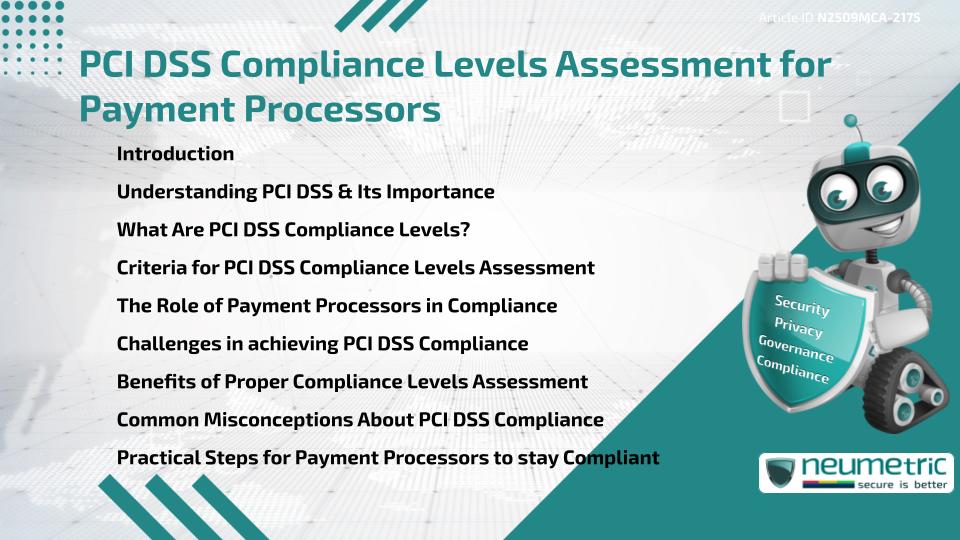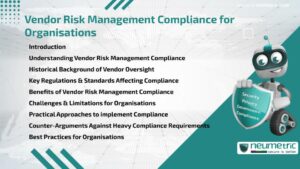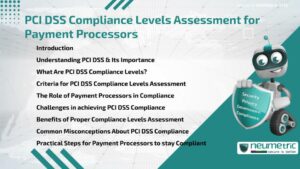Table of Contents
ToggleIntroduction
Payment processors handle millions of card transactions daily, making them prime targets for Cyber Threats. To protect sensitive Cardholder Data, Organisations must undergo a PCI DSS Compliance levels Assessment. This process determines the security requirements an entity must follow based on transaction volume & Risk exposure. For payment processors, accurate compliance Assessment is critical to avoid breaches, maintain trust with clients & meet regulatory demands. This article explains what PCI DSS Compliance levels Assessment means, why it matters, how levels are defined & the practical implications for payment processors.
Understanding PCI DSS & Its Importance
The Payment Card Industry Data Security Standard [PCI DSS] is a global Security Framework created to safeguard Cardholder Data. It was developed by the PCI Security Standards Council [PCI SSC], which includes major credit card brands like Visa, MasterCard, American Express, Discover & JCB.
PCI DSS sets out twelve (12) core requirements that cover areas such as encryption, network monitoring & Access Control. Compliance is not just a technical matter but also a legal & reputational safeguard. Non-compliance can lead to fines, loss of merchant accounts & reputational damage. More importantly, compliance builds trust with both merchants & customers.
What Are PCI DSS Compliance Levels?
PCI DSS Compliance is categorized into four (4) levels. These levels are determined mainly by the number of transactions processed annually & whether a data breach has occurred.
- Level 1: For entities processing more than six (6) million Visa or MasterCard transactions annually.
- Level 2: For those processing one (1) to six (6) million transactions annually.
- Level 3: For processors handling twenty thousand (20,000) to one (1) million e-commerce transactions annually.
- Level 4: For smaller entities processing fewer than twenty thousand (20,000) e-commerce transactions or up to one (1) million overall transactions annually.
Each level dictates different validation requirements, such as annual audits, self-Assessment questionnaires & Vulnerability scans.
Criteria for PCI DSS Compliance Levels Assessment
A PCI DSS Compliance levels Assessment typically considers:
- Transaction volume: Higher volumes mean greater Risk & stricter requirements.
- Past Security Incidents: A history of data breaches can raise an entity’s compliance level.
- Processing environment: How & where transactions are processed matters, including whether third parties are involved.
- Geographic scope: Multi-region processing can introduce extra complexity.
The Assessment ensures that entities with the greatest Risk exposure implement the strictest controls.
The Role of Payment Processors in Compliance
Payment processors act as intermediaries between merchants & Banks. Because they handle large-scale transactions, processors usually fall under Level 1 compliance. This requires annual on-site assessments by a Qualified Security Assessor [QSA] and quarterly scans by an Approved Scanning Vendor [ASV].
Processors must also guide their merchant clients in achieving compliance. For example, a processor providing point-of-sale systems must ensure both its own & its clients’ systems are secure.
Challenges in achieving PCI DSS Compliance
Compliance can be challenging for payment processors due to:
- Complex IT infrastructure with multiple endpoints & networks.
- Third Party dependencies such as cloud providers or gateway services.
- Cost of audits & Security Controls, especially for smaller processors.
- Keeping up with evolving Threats like ransomware & phishing.
Despite these challenges, failing compliance carries much higher Financial & reputational Risks.
Benefits of Proper Compliance Levels Assessment
Accurate PCI DSS Compliance levels Assessment provides several benefits:
- Stronger protection against fraud & data theft.
- Reduced Risk of fines & penalties.
- Enhanced reputation with Banks, merchants & customers.
- Streamlined Business Operations through standardised security practices.
Compliance also provides a competitive edge, as merchants often prefer working with processors who demonstrate strong security posture.
Common Misconceptions About PCI DSS Compliance
Several myths surround compliance, including:
- “Compliance is optional”: In reality, card brands mandate PCI DSS Compliance.
- “Only large companies need to comply”: All entities that handle Cardholder Data must comply.
- “Passing once is enough”: Compliance is continuous, not a one-time exercise.
- “Technology alone ensures compliance”: Human processes, Policies & monitoring are equally important.
Practical Steps for Payment Processors to stay Compliant
Payment processors can strengthen compliance by:
- Conducting regular Risk Assessments.
- Training Employees on Data Security Best Practices.
- Segmenting Cardholder Data environments to limit exposure.
- Partnering with qualified Auditors & scanning vendors.
- Keeping thorough documentation of Security Measures.
Takeaways
- PCI DSS is a mandatory global Standard for securing Cardholder Data.
- A PCI DSS Compliance levels Assessment determines the validation requirements for each entity.
- Payment processors usually fall under Level 1 compliance due to high transaction volumes.
- Compliance reduces Risks, builds trust & provides a competitive advantage.
- Continuous effort, not a one-time check, is necessary to remain compliant.
FAQ
What is PCI DSS Compliance levels Assessment?
It is the process of determining an entity’s Compliance Requirements based on transaction volume & Risk exposure.
Why are compliance levels important for payment processors?
They define the specific security validation steps processors must follow to protect Cardholder Data.
Do small payment processors need to comply with PCI DSS?
Yes, even small processors must comply, though their validation requirements may differ from larger ones.
How often should a PCI DSS Compliance levels Assessment be done?
It should be done annually, along with ongoing scans & monitoring.
What happens if a payment processor fails compliance?
They Risk fines, penalties, loss of merchant accounts & reputational damage.
Are Third Party service providers covered under compliance?
Yes, processors must ensure that any third parties handling card data also comply with PCI DSS.
Who conducts PCI DSS audits for Level 1 processors?
Qualified Security Assessors [QSAs] perform annual on-site assessments for Level 1 entities.
Need help for Security, Privacy, Governance & VAPT?
Neumetric provides organisations the necessary help to achieve their Cybersecurity, Compliance, Governance, Privacy, Certifications & Pentesting needs.
Organisations & Businesses, specifically those which provide SaaS & AI Solutions in the Fintech, BFSI & other regulated sectors, usually need a Cybersecurity Partner for meeting & maintaining the ongoing Security & Privacy needs & requirements of their Enterprise Clients & Privacy conscious Customers.
SOC 2, ISO 27001, ISO 42001, NIST, HIPAA, HECVAT, EU GDPR are some of the Frameworks that are served by Fusion – a SaaS, multimodular, multitenant, centralised, automated, Cybersecurity & Compliance Management system.
Neumetric also provides Expert Services for technical security which covers VAPT for Web Applications, APIs, iOS & Android Mobile Apps, Security Testing for AWS & other Cloud Environments & Cloud Infrastructure & other similar scopes.
Reach out to us by Email or filling out the Contact Form…





